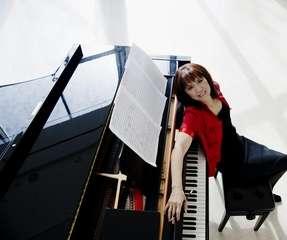|
Back
Samples works from the past 20 years Toronto
Koerner Hall
01/24/2016 -
Samuel Andreyev: Movements and Measures
Daníel Bjarnason: Bow to String
Alexina Louie: Imaginary Opera
R. Murray Schafer: The Falcon’s Trumpet
Bryan Cheng (cello), Robert Venables (trumpet)
Esprit Orchestra, Alex Pauk (conductor) 
A. Louie
The concert opened with the evening’s world premiere, Samuel Andreyev’s Movements and Measures, the second part of an orchestral tryptich. The first part (The Flash of the Instant) was premiered by the Esprit Orchestra last January. The earlier work had a fragmentary quality and this one has much more of an integrated structure - but still with sudden changes of direction within each of the three connected sections. The work makes a downright visceral effect in places, as near the end when what the program describes as a “massive polyphony” comes across as a huge groan.
I assume we will be treated to the entire tryptich upon its completion. It will amount to quite an ambitious undertaking, exactly what Esprit exists to perform.
Icelandic composer Daníel Bjarnason’s Bow to String was composed in 2010 for a solo cellist in a recording studio where it was recorded several times resulting in a multi-layered work. He has since re-scored it for live performance, producing several versions suitable for various sized venues. The one played by Esprit, devised in 2012, is for 15 players (five strings plus winds, percussion, harp and piano) with a cello soloist. The composer describes the piece as going “from the earthly to the ethereal”. Its three movements are “Sorrow conquers Happiness” (hectic and scurrying), “Blood to Bones” (deliberate and plaintive), and “Air to Breath” (this is the ethereal part, where the piece slowly melts away).
Cellist Bryan Cheng appeared with Esprit two years ago when he was 16. I would be able to get a better handle on his tone if the cello did not have to be amplified as it was in Bjarnason’s piece, but I must say that Mr. Cheng and his cello have a good thing going.
Alexina Louie’s Imaginary Opera (completed in 2004, premiered in Paris in 2005) is in many ways a postscript to her opera The Scarlet Princess (composed 1992-2002). It was commissioned by the Canadian Opera Company but in the end received just a single concert performance. The composer has long been working on integrating Eastern and Western approaches to music (born in Canada, she is of Chinese ancestry). The piece employs 12 players all on conventional “western” instruments, but there are echoes of Asian instrumental sounds. The various instruments are deployed with impressive assurance, creating a fascinating array of sonic episodes. In her note she states that “Listeners are encouraged to conjure their own dramatic scenes in their imaginations”. For me, something more evanescent happened. Suffice it to say that this work gives further evidence that Ms Louie is definitely one of our most skilled and persuasive composers.
The final work was R. Murray Schafer’s The Falcon’s Trumpet, composed in 1995 while he was teaching in France and found himself feeling nostalgic about Canadian lakes and forests. In his memoir My Life on Earth and Elsewhere (published in 2012) he tells of choosing to live where he can hear wolves howl (one doesn’t have to go that far from Toronto to achieve this), and over his career he has composed rural site-specific works; one, for example, requires the audience to attend a performance beside a remote lake at dawn. For this piece about 20 members of the orchestra were on stage (along with trumpet soloist Robert Venables), with another 20 or so in four locations at different points around the auditorium. If this was to replicate a spacious outdoor acoustic it simply did not work. A non-traditional venue, such as a sports arena, would be more suitable. The piece begins slowly with a string drone accompanying the lone trumpet, but when the various groups join in, the “surround sound” builds into something more like a battle of the bands, with high pitched brass employed to an oppressive extent. A visit to a remote lake can be marred by, for example, the presence of jet skis; I can’t imagine Mr. Schafer was nostalgic for that.
Michael Johnson
|